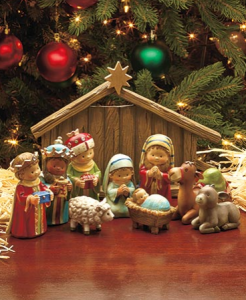Holiday Spirit: Curious Facts About Christmas
 Christmas has evolved quite a bit over the centuries. Santa certainly didn’t deliver gifts at the first Christmas and candy canes weren’t a seasonal candy available in Bethlehem — these customs and traditions were picked up along the way and spread from culture to culture. Here are 5 curious facts about Christmas you didn’t know.
Christmas has evolved quite a bit over the centuries. Santa certainly didn’t deliver gifts at the first Christmas and candy canes weren’t a seasonal candy available in Bethlehem — these customs and traditions were picked up along the way and spread from culture to culture. Here are 5 curious facts about Christmas you didn’t know.
When in Rome Conventional wisdom suggests the Christmas tree tradition was started in Germany because of the seasonal song “O Tannenbaum,” but decorating evergreens for the winter holiday can be traced back to Ancient Rome. Ancient Romans dressed boughs of evergreen trees with fruits and nuts for their Saturnalia celebrations each winter. Early Christians may have adopted the evergreen tree as a symbol of rebirth and renewal to make the holiday feel more familiar to Roman converts to Christianity. The German tradition dates from the 1700s, but it didn’t catch on in England and America until the 1800s when Queen Victoria wrote about her happy memories of decorating trees as a princess.
 X Marks the Holiday Most people believe the “X” in Xmas is a way for advertisers to shorten the name of the holiday, but the nickname has a long history that has nothing to do with marketing and commerce. It’s a deeply religious symbol that got its start in monasteries. First commonly used in religious texts in the 1400s, the letter “X” signified the cross and was the first letter of Christ’s name in the Greek alphabet. For monks who spent hours toiling over manuscripts, finding a way to write quickly and efficiently was vital. When they replaced Christ’s name with an X, they were using what linguists call a Christogram.
X Marks the Holiday Most people believe the “X” in Xmas is a way for advertisers to shorten the name of the holiday, but the nickname has a long history that has nothing to do with marketing and commerce. It’s a deeply religious symbol that got its start in monasteries. First commonly used in religious texts in the 1400s, the letter “X” signified the cross and was the first letter of Christ’s name in the Greek alphabet. For monks who spent hours toiling over manuscripts, finding a way to write quickly and efficiently was vital. When they replaced Christ’s name with an X, they were using what linguists call a Christogram.
American Revolution Christmas was once illegal in Boston. Until 1681, celebrating Christmas in Puritan Boston would cost you a five-shilling fine. Eventually, civic leaders loosened up and allowed Christmas celebrations, but even then, early Americans weren’t big on the holiday; in fact, some Puritans considered it a holdover from Catholicism. It didn’t become a federal holiday until 1870, in part because the Puritans disapproved.
Little People Louisa May Alcott, the author famous for writing Little Women and Little Men, penned many short stories, novels and non-fiction articles, but a lesser known fact is that she’s responsible for giving Santa his elves. One of her short stories in 1856 mentioned Christmas elves, pointy-capped creatures who helped Santa Claus care for his reindeer and make gifts for good children. Although the story wasn’t published in her lifetime, she shared it with other writers, and a few years later, a story about Santa’s elves appeared in a copy of the magazine “Godey’s Lady’s Book,” one of the most influential publications of its time. Meg, Jo, Beth and Amy are enduring characters, but Alcott’s most famous literary creations might be Santa’s little helpers.
Merry Petmas! Most people who have pets consider them part of the family. About 64% of American pet owners buy their pets gifts — some even hang the requisite stocking over the fireplace. Extra treats, a squeaky toy or a pet bed, we want to bring holiday cheer to every member of the family, four-legged and otherwise.
Happy holidays from LTD! Whether you’re celebrating with extended family or you’re having a quiet holiday with your pup, we wish you well this season and for the year to come.





